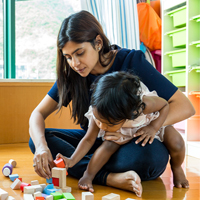How Parenting Styles Create Mindsets By Dr. Namitha Raju

Several schools are introducing kids to the concept of a fixed mindset versus a growth mindset as part of their social-emotional learning program. It’s a great awareness tool, thanks to studies by Stanford University researcher Dr. Carol Dweck.
 Dr. Dweck’s research discovered the two main ways people think about their ability to do things: the fixed mindset and the growth mindset. Her research looks at the sources of these two distinct mindsets, their role in motivation and self-regulation, and how it influences achievement and interpersonal relations. The illustration above shows how people with growth and fixed mindsets go through their lives. When I read this for the first time, I felt a punch in my gut because I could relate to many of the beliefs listed under the fixed mindset. It didn’t feel good at all! The fixed mindset develops from interactions with parents who employ a controlling or dominant parenting style. When we were growing up, the power-over way of parenting was the most prevalent. Sadly this parenting style, which is quite pervasive even now, has adverse effects on emotional growth.
Dr. Dweck’s research discovered the two main ways people think about their ability to do things: the fixed mindset and the growth mindset. Her research looks at the sources of these two distinct mindsets, their role in motivation and self-regulation, and how it influences achievement and interpersonal relations. The illustration above shows how people with growth and fixed mindsets go through their lives. When I read this for the first time, I felt a punch in my gut because I could relate to many of the beliefs listed under the fixed mindset. It didn’t feel good at all! The fixed mindset develops from interactions with parents who employ a controlling or dominant parenting style. When we were growing up, the power-over way of parenting was the most prevalent. Sadly this parenting style, which is quite pervasive even now, has adverse effects on emotional growth.
“In daily interactions, parents who employ this parenting style seek control over their children, indirectly through blaming, shaming, sarcasm, or directly through yelling and punishments. The result is a power struggle, ‘parents versus kids,’ a winner and a loser.”
 Ultimately, this weakens connection and communication between the parent and child. Additionally, it erodes the child’s sense of self-worth and confidence. And this is where children learn limiting beliefs, such as, ” I’m only loved and accepted when I fall in line.” This conditional acceptance from parents lays the foundation for a fixed mindset, rigid beliefs about self, and inflexibility to grow emotionally. As progressive parents, we all want to raise kids with a growth mindset where things are not black or white but where there is a continuum of possibilities and hope. We can achieve this goal by providing unconditional acceptance to our kids. Sadly, it is hard to provide unconditional acceptance when our subconscious thinking and attitudes are only familiar with conditional and controlling versions of parenting because of the way we were raised.
Ultimately, this weakens connection and communication between the parent and child. Additionally, it erodes the child’s sense of self-worth and confidence. And this is where children learn limiting beliefs, such as, ” I’m only loved and accepted when I fall in line.” This conditional acceptance from parents lays the foundation for a fixed mindset, rigid beliefs about self, and inflexibility to grow emotionally. As progressive parents, we all want to raise kids with a growth mindset where things are not black or white but where there is a continuum of possibilities and hope. We can achieve this goal by providing unconditional acceptance to our kids. Sadly, it is hard to provide unconditional acceptance when our subconscious thinking and attitudes are only familiar with conditional and controlling versions of parenting because of the way we were raised.
This vicious cycle is hard to break without support. Mindset changes take time, but I am grateful I took the leap because the changes I saw in myself directly impacted my parenting, and I started seeing my kids showing much more openness than before! If you aren’t sure how to turn things around in your parenting, you aren’t alone! Join the growing community of conscious parents who want to transform their parenting style and raise kids with a growth mindset.
About the Author
 Namitha Raju is a Certified Master Parent Coach. She coaches parents to develop deep connections and peace in their relationships with their kids. Her company, Beautiful Bonds, is based on the principle that emotional growth, healthy relationships, and personal transformation are the keys to fulfilling parenthood. Dr. Raju received a Ph.D. in Psychology, where she studied early development. As a mom of two kids, she found that her academic experience couldn’t rescue her from her day-to-day parenting challenges! Her curiosity led her to garner the expertise necessary to inculcate deep connections between parent and child. She serves parents virtually throughout the US. If you would like to find out more, please visit https://beautifulbonds.me.
Namitha Raju is a Certified Master Parent Coach. She coaches parents to develop deep connections and peace in their relationships with their kids. Her company, Beautiful Bonds, is based on the principle that emotional growth, healthy relationships, and personal transformation are the keys to fulfilling parenthood. Dr. Raju received a Ph.D. in Psychology, where she studied early development. As a mom of two kids, she found that her academic experience couldn’t rescue her from her day-to-day parenting challenges! Her curiosity led her to garner the expertise necessary to inculcate deep connections between parent and child. She serves parents virtually throughout the US. If you would like to find out more, please visit https://beautifulbonds.me.
























